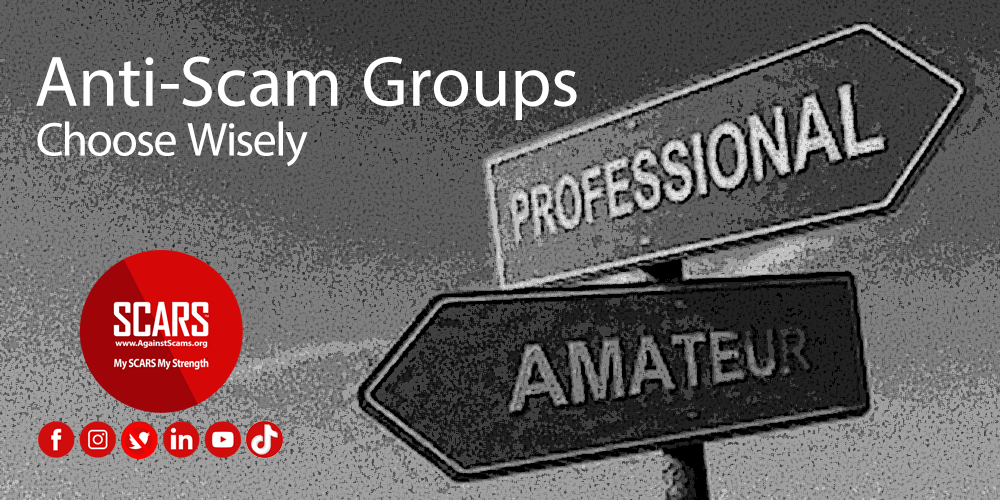Choose Wisely What Anti-Scam Groups You Follow
Self-Styled Experts & Vigilantes Are Everywhere!
Making Things Worse In Many Cases!
A SCARS Commentary
Anti-scam Hate Groups and Vigilantes
Over Our 30 Year History, We Have Encountered Many Victims That Wanted To Help Other Victims, And That Is A Good Thing!
Except when their motivation is based upon hate, anger, or a self-conviction that they are the only ones that can save everyone.
Unfortunately, more than half of all anti-scam groups fall into this mindset. The tragic part of this is that new victims or those that are still clinging to their anger gravitate to the amateur groups and do not get the help they need.
Who are we to say what victims need?
Consider – we are a crime victims’ assistance organization, incorporated in the state of Florida. Our partners include the U.S. Department of Homeland Security. Our team has been helping online crime victims for 30 years! We have engaged in some of the widest-ranging research on this subject and worked with academic institutions around the world to better understand the trauma that scam victims experience and how to support them.
Let’s talk about Anti-scam Hate Groups and Vigilantes
Vigilantes tend to be the ones that create about half of the Anti-scam groups
What is an Anti-scam Hate Group? These are typically lead by a victim that has retained their rage and anger against scammers and turned this into a kind of mania. Actually, it is something called Messiah Syndrom or Savior Syndrome.
THESE ARE THE TRUE VIGILANTES
Vigilantes tend to be those victims that are profoundly and adversely affected by the aftermath of the scam. It affects them in a way that forces their fear and anger to dominate.
Their initial lack of control and sense of powerlessness triggers the need for retaliation and vengeance, frequently directly towards other victims and victims’ assistance providers (such as police and victims assistance organizations like SCARS), not just the criminals that harmed them. Their actions tend to be performed online without any real commitment to a specific objective – other than to “get justice”, acting to be disruptive and counter-productive to real solutions.
It is all “Their Way or No Way,” and everyone is with them or against them. Vigilantism is also a significant cause of delay in these victims recovering, as it perpetuates their anger or rage and frequently turning it into destructive hate.
It is nearly impossible to assist these victims as they are suspicious of anyone offering help, especially those with greater knowledge and professionalism, and tend to aggregate into like-minded groups online.
There is no evidence that any vigilante has resulted in a single arrest or reduction in online crimes. In fact, there is substantial evidence that Vigilantes work against their best interest by alienating those entities that are best equipped to help them and society as a whole.
Most Vigilantes refuse to properly report the crimes since (in their view) “no one does anything anyway” – only they can save the world. They tend to view themselves as the only true “Anti-scammers” and their approach is the only correct one.
Why Is Being A Vigilante A Bad Thing?
- First, they have no real experience in fighting crime. They don’t know how to find or prepare real evidence. They just post scammers online, without any ethical constraints.
- Second, they do not understand the reality of trauma and how continuous exposure to the crime can cause further harm to themselves and victims.
- Lastly, they believe that they are the only true saviors and that anyone that has a different approach is the enemy or a scammer. So they actively work against the real solutions, professionals, and institutions making a real difference.
They are chaos engines that delay progress, cause further harm to victims, and create completely false impressions of both who scammers are and the state of the global war on scams.
When victims turn toward their anger and aggression, it delays or prevents recovery. These are not the pinnacles of insight that victims should turn to.
Why Do We Issue This Warning?
We really do not care what individuals do, they have a right to speech and their own actions, except when they are luring in victims to truly need help. Countless victims are lured into these groups and fed victims a steady diet of misinformation, urban legends, and fake solutions. This causes real harm to people in the worst times of their lives.
This is why we make the effort to warn victims at every stage of the post-scam recovery. With the hope that in time, they can understand the difference and seek professional help either from SCARS, our partners, allied professionals, or professionals in other fields (such as trauma counselors or therapists) that can help them.
We are very willing to help amateurs learn the proper methods to support victims and follow the proper ethical standards. SCARS allows individuals or groups to partner or volunteer with us so that they can do a better job to help all victims. All they need to do is contact us and we can help them learn the right approach.
Choose The Group You Follow Wisely!
There is plenty of room for many voices, but all voices need to be following the path that actually helps make things better!
PLEASE SHARE OUR ARTICLES WITH YOUR FRIENDS & FAMILY
HELP OTHERS STAY SAFE ONLINE – YOUR KNOWLEDGE CAN MAKE THE DIFFERENCE!
THE NEXT VICTIM MIGHT BE YOUR OWN FAMILY MEMBER OR BEST FRIEND!
By the SCARS™ Editorial Team
Society of Citizens Against Relationship Scams Inc.
A Worldwide Crime Victims Assistance & Crime Prevention Nonprofit Organization Headquartered In Miami Florida USA & Monterrey NL Mexico, with Partners In More Than 60 Countries
To Learn More, Volunteer, or Donate Visit: www.AgainstScams.org
Contact Us: Contact@AgainstScams.org




Please Leave A Comment - Tell Us What You Think About This!